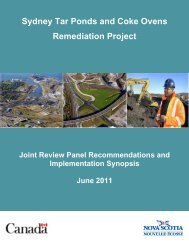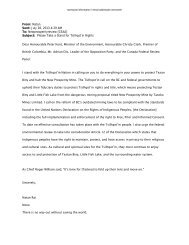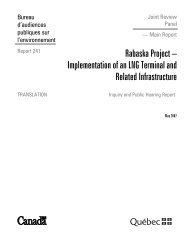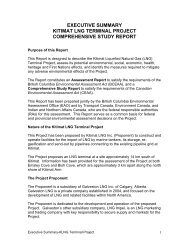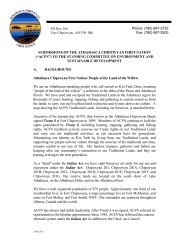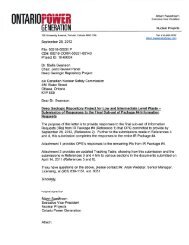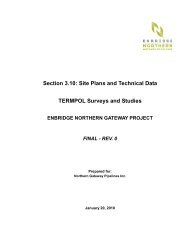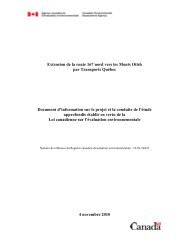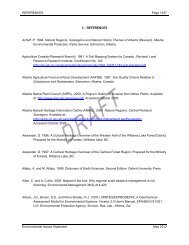Kearl Oil Sands Project
Kearl Oil Sands Project
Kearl Oil Sands Project
You also want an ePaper? Increase the reach of your titles
YUMPU automatically turns print PDFs into web optimized ePapers that Google loves.
42 Section 71 of the Utilities Commission Act focuses on whether the EPA is in the public<br />
interest. I think the respondents advance too narrow a construction of public interest when they<br />
define it solely in economic terms. How can a contract formed by a Crown agent in breach of a<br />
constitutional duty be in the public interest? The existence of such a duty and the allegation of the<br />
breach must form part and parcel of the public interest inquiry. In saying that, I do not lose sight of<br />
the fact that the regulatory scheme revolves around the economics of energy: ATCO Gas &<br />
Pipelines Ltd. v. Alberta (Energy & Utilities Board), 2006 SCC 4, [2006] 1 S.C.R. 140, and that<br />
Aboriginal law is not in the steady diet of the Commission. But there is no other forum more<br />
appropriate to decide consultation issues in a timely and effective manner. As I will develop later,<br />
the rationale for the duty to consult, explained in Haida Nation v. British Columbia (Minister of<br />
Forests), discourages resort to the ordinary courts for injunctive relief and encourages less<br />
contentious measures while reconciliation is pursued. It would seem to follow that the appropriate<br />
forum for enforcement of the duty to consult is in the first instance the tribunal with jurisdiction<br />
over the subject-matter - here the Commission in relation to the EPA.<br />
43 B.C. Hydro cites this Court's decision in British Columbia Hydro & Power Authority v. British<br />
Columbia (Utilities Commission) (1996), 20 B.C.L.R. (3d) 106, as support for the argument that s.<br />
71 should not be interpreted to include the power to assess adequacy of consultation. It was held in<br />
that case that the governing statute, then the Utilities Commission Act, S.B.C. 1980, c. 60, did not<br />
confer jurisdiction on the Commission to enforce as mandatory the guidelines it developed on<br />
resource planning. One of the guidelines required public consultation, the inadequacy of which, as<br />
perceived by the Commission, led it to issue directions to B.C. Hydro in connection with an<br />
application for a certificate of public convenience and necessity. The Court examined the contested<br />
power to enforce guidelines against the language of the Act, its purpose and object, and found that<br />
no explicit provision enabled the Commission to promulgate mandatory guidelines which intruded<br />
on the management of the utility and none should be implied.<br />
44 On the strength of that case, B.C. Hydro turns to Dunsmuir v. New Brunswick, 2008 SCC 9,<br />
291 D.L.R. (4th) 577, for the following general proposition that it says applies to the present matter:<br />
[28] By virtue of the rule of law principle, all exercises of public authority must<br />
find their source in law. All decision-making powers have legal limits, derived<br />
from the enabling statute itself, the common or civil law or the Constitution.<br />
Judicial review is the means by which the courts supervise those who exercise<br />
statutory powers, to ensure that they do not overstep their legal authority. The<br />
function of judicial review is therefore to ensure the legality, the reasonableness<br />
and the fairness of the administrative process and its outcomes.<br />
[29] Administrative powers are exercised by decision makers according to<br />
statutory regimes that are themselves confined. A decision maker may not<br />
exercise authority not specifically assigned to him or her. By acting in the<br />
Page 20



